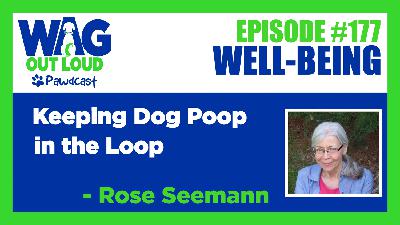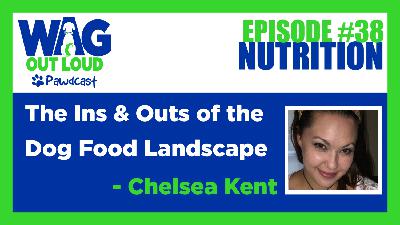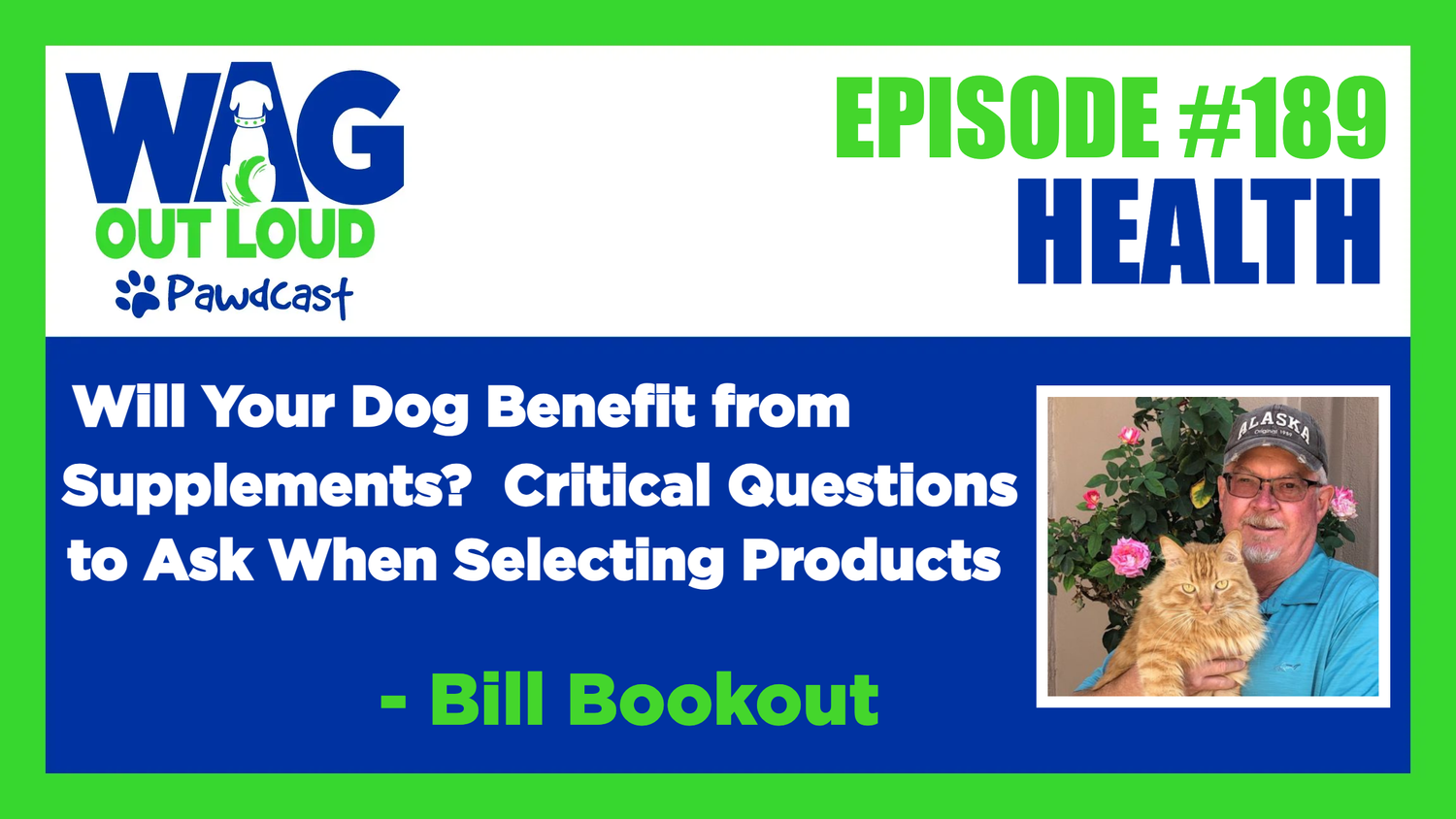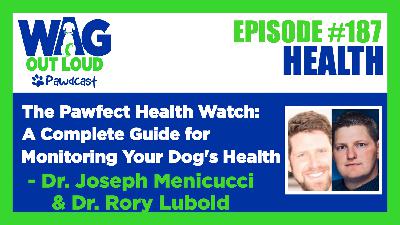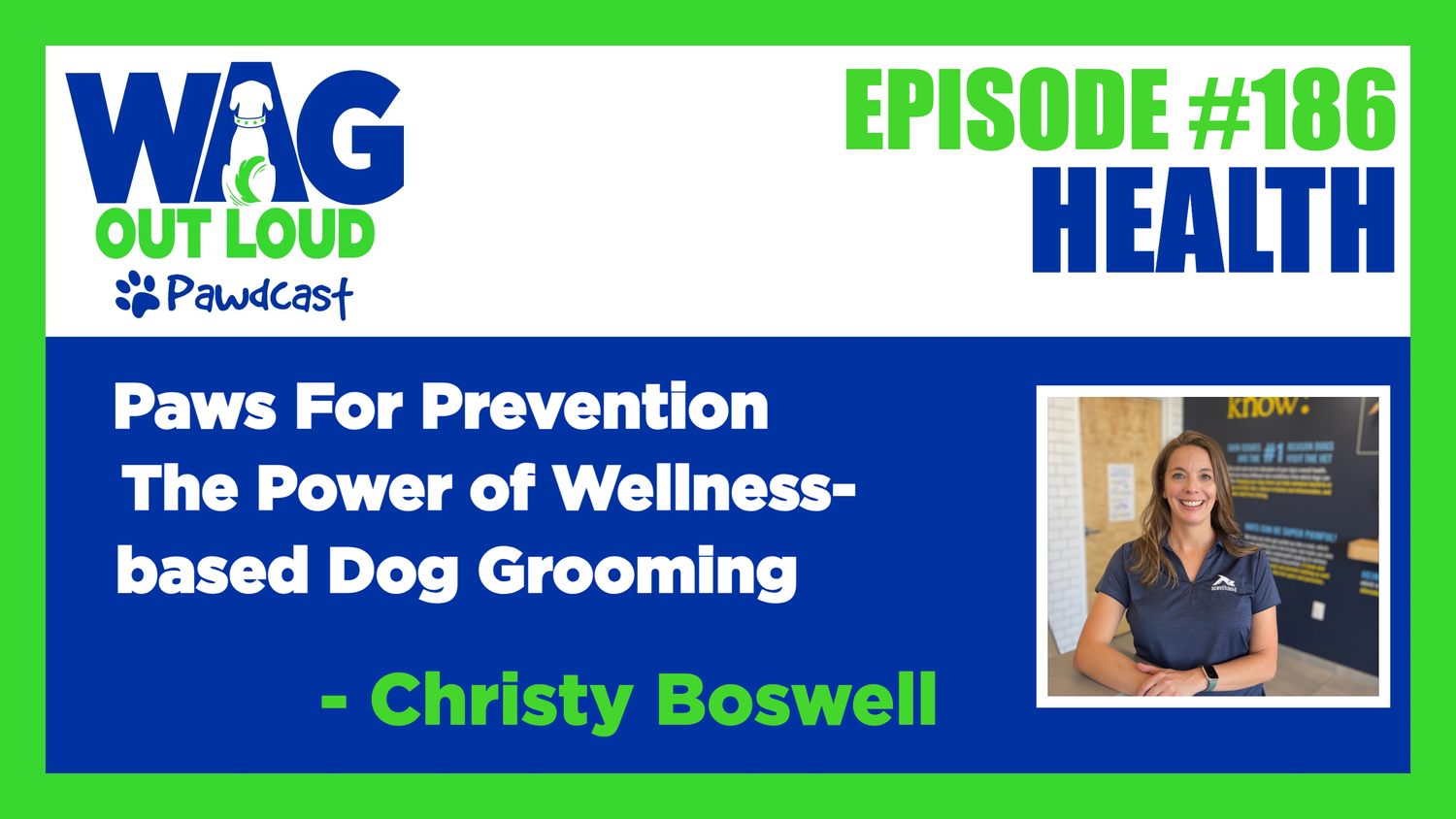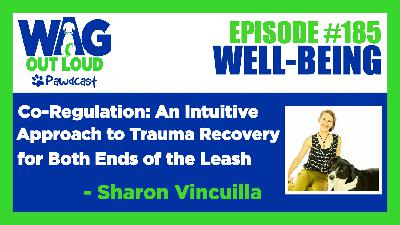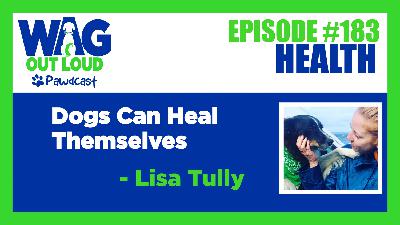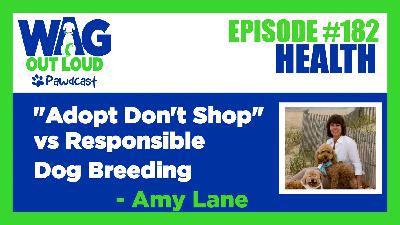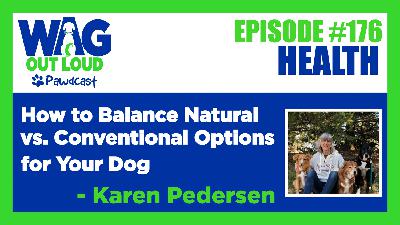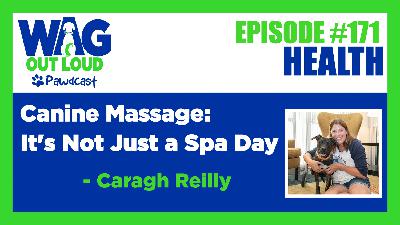Keeping Dog Poop in the Loop
Update: 2023-06-07
Description
Hello everyone this is Krista with Episode #177 on the Wag Out Loud pawdcast. Hey, have you checked out all the amazing trusted brands that I highly recommend? These are products that I've researched. And I've tried that I know like and trust, and these are products that will help your dog to thrive. Just go to WagOutLoud.com and check out the Trusted Brands section. And I've negotiated discounts for most of the products, so why not see what can make a difference in your dog's life? And don't forget to also check out the resources page as well, because it's filled with some very important info for both you and your dog.
Since we just bought our new puppy Dutton home, there's a lot of potty training happening here in this house. Generally during the night puppies can hold it for as many hours as their age in months plus one hour. So that means that a three month old puppy should be able to hold it for approximately four hours.
Welcome to the Wag Out Loud pawdcast, where we are obsessed with bringing you helpful tips on canine health care, nutrition, and overall wellbeing. If you'd like to support the show, check out the amazing online events, products and resources that I personally recommend on the Wag Out Loud website. I'm your host, Krista and I'm super excited to be bringing you yet another tail wagging episode.
Hello there dog lovers, and welcome to another educational episode of the Wag Out Loud pawdcast. And with me today is Rose Seemann, and she's here to chat about keeping dog poop in the loop. Rose, I first want to thank you for being with us today. How are you?
I'm fine. How are you? Krista?
I am good. Before we kick this off, why don't you introduce yourself and share with us how did your passion for dog waste disposal really start?
Oh, it was an odd thing. I was having lunch in a park. right near where I worked. This was maybe Oh 15 years ago, I'm retired now. And I saw people picking up all this dog poop. And I was reading a book called Natural Capitalism, which talked about the ability or how we should have the ability to recycle absolutely everything and return it back to nature, starting at the beginning, kind of like Cradle to Cradle. And something just clicked and I thought, look at these people picking up all this organic stuff. You know, I wonder if they sort it. Well, that was silly. They throw it in the trash, and it goes into the, you know, into the landfill. I thought there must be an awful lot of it. Because I'm sitting here just watching and I'm already seeing an awful lot of it go into that bin there. So I went back to the office. And I started thinking how many how much dog poop is there must be a lot. And then I started doing a little research. And the more I learned the more horrified kind of it I was because there are tons and tons and tons of it going into landfills with plastic bags. And it it also, you know, it emits methane, which is not good. And then I got more and more into it. And I realized that there's as much dog waste going into landfills every year in the United States. There's enough to fill 109 football fields with end zones 10 feet deep every year going into landfills. And I thought geez, my state, I found out the state puts in like any number of the weight of it is is kind of like several, you know, Washington Monuments. I mean, it's incredible. And it's actually kind of 12% of residential waste. Okay, you know, my research and my thinking got me into it.
Yeah. Well, to put some statistics behind what you're talking about, I read that a dog excretes between .5 - .75 pounds of waste per day. And one gram of dog waste contains about 23 million coliform bacteria, which is nearly twice the amount found in the equivalent of human waste. And in the United States, pet dogs produced 21 point 2 billion pounds of dog poop each year. That is a problem.
It's amazing because we're all worried about how many straws we throw out. Yes or how many Cigarette cigarette butts we throw out things like that coffee stirrers, even shoes and textiles. I mean, when you if you have a dog or two, you know that that's really heavy. If you collect it at home in your, you know, your garbage bag, more than certainly a lot of stuff that you throw out. It's organic, and it can be recycled.
Well, let's break this down. So many people, I think they think that if we leave dog waste, and don't even pick it up, oh, it's just gonna decompose naturally over time, and will actually serve as a natural fertilizer. Is that true Rose?
Raw dog poop has all those horrible pathogens in it, if you just leave it there, and it rains, it could wash into storm sewers. And it could cause a lot of damage. I mean, they're reservoirs and lakes that are closed, that are near dog areas. So it can cause algae blooms that can kill, you know, aquatic animals. And then you can step on it. I mean, it's just not a pretty picture. And that stuff stays on your shoes, stays on kids shoes stays on dog paws and goes into your house. No, it has to be composted. It has to be processed before it's good for plants. It's just, it'll kill plants because it's too harsh.
And does this have anything to do with what they're eating? Like in the wild, let's say wolves or wild dogs? Is it the same composition? Because they eat well, natural?
No. And first of all, scat for wild animals is scattered all over the place with dogs. They're all it's all in the same place concentrated. But from what I learned that the when dogs eat more grain, they produce more poop. And when they eat meat, there's not as much of it. But as far as the composition. I'm not too sure about that.
Right? Okay. So many of us use, let's say, the plastic grocery bag. And we think we're doing such a good thing because we are reusing these grocery bags for another purpose. But what about the bags that we use? And what happens in a landfill?
Well, when you collect it in a bag, and it's probably better to reuse a bag than to actually buy a plastic bag. But when you throw those throw those in a landfill, they just sit there, nothing happens. They don't go back to the earth or anything like everything in the landfill. There's no air, and there's no sun and there's no moisture just kind of sits there. And eventually it kind of seeps the methane seeps out. Takes a long time. And of course, then you've got the plastic there. Right. So probably the best solution is to get certified compostable bags, and use those, even if it's going into a landfill, because at least you're supporting compostable bags. And eventually, if they get out, they're not going to be, you know, in the ocean or anything like that. And also, when you buy compostable bags, you're helping an industry The more people that buy compostable bags, the less expensive they're going to be eventually. So it's sort of an investment. But, you know, I would add that in Canada, there are any number of municipalities that actually compost their dog waste. With food scraps and yard waste, they just take it and compost that all or throw it into bio digesters, in which case many of them say that you need to use compostable bags or paper bags depending on their system. But in America that's so so rare.
We are behind the times Rose.
Yeah. And Australia's coming quite a bit ahead, too. I'm not quite sure what's going on in Europe. But you know, a lot of composters are just won't accept dog waste. You could mix it in with your yard waste. They say don't don't give it to us with your food scraps.
Right. Well, you already told us about how it contaminates the water. And we know that waste can transmit diseases to both animals and humans. Because, you know, some of the illnesses that I can think of are from E coli, Salmonella, Leptospira, you know, all of that bacteria that is found in dog waste. And then another thing I think of is internal parasites. If you have dogs with any type of worms, and another dog comes into contact with that waist that's left behind. That could be an issue for the other dog.
And if it gets on someone's skin as Little Rascals can penetrate skin, but if it's composted, if it's Biodigested, if it's tested, it can be fine compost to be used anywhere. It's just a matter if you know the process.
Exactly. Well, let's talk about this because as you said, this is pretty new process and idea, I think. So you started the Enviro Pet Waste Network, which is a nonprofit. Can you tell us a little bit about that organization and what you're trying to do, and then let's really get into how to compost our dog's waste.
Sure. The Enviro Pet Waste Network is a 501 C three, nonprofit, and it's only about a year and a half old. It's mostly right now, Canada, United States and Australia. We try to bring people together to share success stories, and to talk to one another and to educate people, very important to educate them about what kind of bags to use what they can do with their own dog waste, if, in fact, their community isn't doing anything, what they can do to advocate so that their community, you know, does some sort of solution for the whole community. For instance, here in Colorado, on the Front Range EnviroWagg, which is, which is a program of the Enviro pet waste, network, compost, tons of dog waste, you know, every month, from trail heads, and from dog parks and from dog daycare centers. And that's a community effort. So it can be done. There are two places in New York City, that are really running ahead right now with this. And the Enviro Pet Waste Network, you know, does videos, it connects people. People call and say what can I do for my own dog? What can we do for the community? And, you know, we put them in touch with people who have done it, so that they have good advice on how to both compost their own, and how to, you know, advocate for community composting or bio digestion.
And what does that mean? Let's say a community wants to put this program in place this upcycling, as you call it, wha
Since we just bought our new puppy Dutton home, there's a lot of potty training happening here in this house. Generally during the night puppies can hold it for as many hours as their age in months plus one hour. So that means that a three month old puppy should be able to hold it for approximately four hours.
Welcome to the Wag Out Loud pawdcast, where we are obsessed with bringing you helpful tips on canine health care, nutrition, and overall wellbeing. If you'd like to support the show, check out the amazing online events, products and resources that I personally recommend on the Wag Out Loud website. I'm your host, Krista and I'm super excited to be bringing you yet another tail wagging episode.
Hello there dog lovers, and welcome to another educational episode of the Wag Out Loud pawdcast. And with me today is Rose Seemann, and she's here to chat about keeping dog poop in the loop. Rose, I first want to thank you for being with us today. How are you?
I'm fine. How are you? Krista?
I am good. Before we kick this off, why don't you introduce yourself and share with us how did your passion for dog waste disposal really start?
Oh, it was an odd thing. I was having lunch in a park. right near where I worked. This was maybe Oh 15 years ago, I'm retired now. And I saw people picking up all this dog poop. And I was reading a book called Natural Capitalism, which talked about the ability or how we should have the ability to recycle absolutely everything and return it back to nature, starting at the beginning, kind of like Cradle to Cradle. And something just clicked and I thought, look at these people picking up all this organic stuff. You know, I wonder if they sort it. Well, that was silly. They throw it in the trash, and it goes into the, you know, into the landfill. I thought there must be an awful lot of it. Because I'm sitting here just watching and I'm already seeing an awful lot of it go into that bin there. So I went back to the office. And I started thinking how many how much dog poop is there must be a lot. And then I started doing a little research. And the more I learned the more horrified kind of it I was because there are tons and tons and tons of it going into landfills with plastic bags. And it it also, you know, it emits methane, which is not good. And then I got more and more into it. And I realized that there's as much dog waste going into landfills every year in the United States. There's enough to fill 109 football fields with end zones 10 feet deep every year going into landfills. And I thought geez, my state, I found out the state puts in like any number of the weight of it is is kind of like several, you know, Washington Monuments. I mean, it's incredible. And it's actually kind of 12% of residential waste. Okay, you know, my research and my thinking got me into it.
Yeah. Well, to put some statistics behind what you're talking about, I read that a dog excretes between .5 - .75 pounds of waste per day. And one gram of dog waste contains about 23 million coliform bacteria, which is nearly twice the amount found in the equivalent of human waste. And in the United States, pet dogs produced 21 point 2 billion pounds of dog poop each year. That is a problem.
It's amazing because we're all worried about how many straws we throw out. Yes or how many Cigarette cigarette butts we throw out things like that coffee stirrers, even shoes and textiles. I mean, when you if you have a dog or two, you know that that's really heavy. If you collect it at home in your, you know, your garbage bag, more than certainly a lot of stuff that you throw out. It's organic, and it can be recycled.
Well, let's break this down. So many people, I think they think that if we leave dog waste, and don't even pick it up, oh, it's just gonna decompose naturally over time, and will actually serve as a natural fertilizer. Is that true Rose?
Raw dog poop has all those horrible pathogens in it, if you just leave it there, and it rains, it could wash into storm sewers. And it could cause a lot of damage. I mean, they're reservoirs and lakes that are closed, that are near dog areas. So it can cause algae blooms that can kill, you know, aquatic animals. And then you can step on it. I mean, it's just not a pretty picture. And that stuff stays on your shoes, stays on kids shoes stays on dog paws and goes into your house. No, it has to be composted. It has to be processed before it's good for plants. It's just, it'll kill plants because it's too harsh.
And does this have anything to do with what they're eating? Like in the wild, let's say wolves or wild dogs? Is it the same composition? Because they eat well, natural?
No. And first of all, scat for wild animals is scattered all over the place with dogs. They're all it's all in the same place concentrated. But from what I learned that the when dogs eat more grain, they produce more poop. And when they eat meat, there's not as much of it. But as far as the composition. I'm not too sure about that.
Right? Okay. So many of us use, let's say, the plastic grocery bag. And we think we're doing such a good thing because we are reusing these grocery bags for another purpose. But what about the bags that we use? And what happens in a landfill?
Well, when you collect it in a bag, and it's probably better to reuse a bag than to actually buy a plastic bag. But when you throw those throw those in a landfill, they just sit there, nothing happens. They don't go back to the earth or anything like everything in the landfill. There's no air, and there's no sun and there's no moisture just kind of sits there. And eventually it kind of seeps the methane seeps out. Takes a long time. And of course, then you've got the plastic there. Right. So probably the best solution is to get certified compostable bags, and use those, even if it's going into a landfill, because at least you're supporting compostable bags. And eventually, if they get out, they're not going to be, you know, in the ocean or anything like that. And also, when you buy compostable bags, you're helping an industry The more people that buy compostable bags, the less expensive they're going to be eventually. So it's sort of an investment. But, you know, I would add that in Canada, there are any number of municipalities that actually compost their dog waste. With food scraps and yard waste, they just take it and compost that all or throw it into bio digesters, in which case many of them say that you need to use compostable bags or paper bags depending on their system. But in America that's so so rare.
We are behind the times Rose.
Yeah. And Australia's coming quite a bit ahead, too. I'm not quite sure what's going on in Europe. But you know, a lot of composters are just won't accept dog waste. You could mix it in with your yard waste. They say don't don't give it to us with your food scraps.
Right. Well, you already told us about how it contaminates the water. And we know that waste can transmit diseases to both animals and humans. Because, you know, some of the illnesses that I can think of are from E coli, Salmonella, Leptospira, you know, all of that bacteria that is found in dog waste. And then another thing I think of is internal parasites. If you have dogs with any type of worms, and another dog comes into contact with that waist that's left behind. That could be an issue for the other dog.
And if it gets on someone's skin as Little Rascals can penetrate skin, but if it's composted, if it's Biodigested, if it's tested, it can be fine compost to be used anywhere. It's just a matter if you know the process.
Exactly. Well, let's talk about this because as you said, this is pretty new process and idea, I think. So you started the Enviro Pet Waste Network, which is a nonprofit. Can you tell us a little bit about that organization and what you're trying to do, and then let's really get into how to compost our dog's waste.
Sure. The Enviro Pet Waste Network is a 501 C three, nonprofit, and it's only about a year and a half old. It's mostly right now, Canada, United States and Australia. We try to bring people together to share success stories, and to talk to one another and to educate people, very important to educate them about what kind of bags to use what they can do with their own dog waste, if, in fact, their community isn't doing anything, what they can do to advocate so that their community, you know, does some sort of solution for the whole community. For instance, here in Colorado, on the Front Range EnviroWagg, which is, which is a program of the Enviro pet waste, network, compost, tons of dog waste, you know, every month, from trail heads, and from dog parks and from dog daycare centers. And that's a community effort. So it can be done. There are two places in New York City, that are really running ahead right now with this. And the Enviro Pet Waste Network, you know, does videos, it connects people. People call and say what can I do for my own dog? What can we do for the community? And, you know, we put them in touch with people who have done it, so that they have good advice on how to both compost their own, and how to, you know, advocate for community composting or bio digestion.
And what does that mean? Let's say a community wants to put this program in place this upcycling, as you call it, wha
Comments
In Channel

